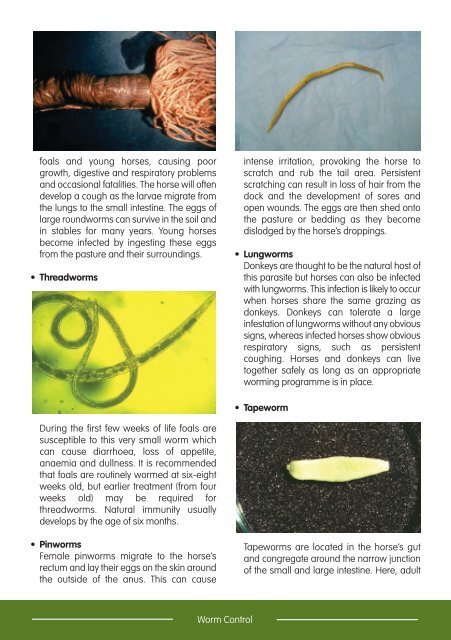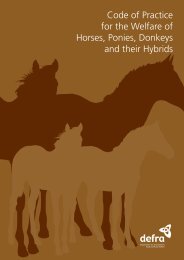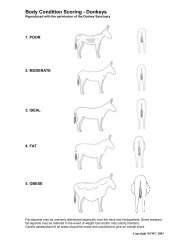Leaflet - Worm Control and Worming - British Horse Society
Leaflet - Worm Control and Worming - British Horse Society
Leaflet - Worm Control and Worming - British Horse Society
You also want an ePaper? Increase the reach of your titles
YUMPU automatically turns print PDFs into web optimized ePapers that Google loves.
foals <strong>and</strong> young horses, causing poor<br />
growth, digestive <strong>and</strong> respiratory problems<br />
<strong>and</strong> occasional fatalities. The horse will often<br />
develop a cough as the larvae migrate from<br />
the lungs to the small intestine. The eggs of<br />
large roundworms can survive in the soil <strong>and</strong><br />
in stables for many years. Young horses<br />
become infected by ingesting these eggs<br />
from the pasture <strong>and</strong> their surroundings.<br />
• Threadworms<br />
intense irritation, provoking the horse to<br />
scratch <strong>and</strong> rub the tail area. Persistent<br />
scratching can result in loss of hair from the<br />
dock <strong>and</strong> the development of sores <strong>and</strong><br />
open wounds. The eggs are then shed onto<br />
the pasture or bedding as they become<br />
dislodged by the horse’s droppings.<br />
• Lungworms<br />
Donkeys are thought to be the natural host of<br />
this parasite but horses can also be infected<br />
with lungworms. This infection is likely to occur<br />
when horses share the same grazing as<br />
donkeys. Donkeys can tolerate a large<br />
infestation of lungworms without any obvious<br />
signs, whereas infected horses show obvious<br />
respiratory signs, such as persistent<br />
coughing. <strong>Horse</strong>s <strong>and</strong> donkeys can live<br />
together safely as long as an appropriate<br />
worming programme is in place.<br />
• Tapeworm<br />
During the first few weeks of life foals are<br />
susceptible to this very small worm which<br />
can cause diarrhoea, loss of appetite,<br />
anaemia <strong>and</strong> dullness. It is recommended<br />
that foals are routinely wormed at six-eight<br />
weeks old, but earlier treatment (from four<br />
weeks old) may be required for<br />
threadworms. Natural immunity usually<br />
develops by the age of six months.<br />
• Pinworms<br />
Female pinworms migrate to the horse’s<br />
rectum <strong>and</strong> lay their eggs on the skin around<br />
the outside of the anus. This can cause<br />
Tapeworms are located in the horse’s gut<br />
<strong>and</strong> congregate around the narrow junction<br />
of the small <strong>and</strong> large intestine. Here, adult<br />
<strong>Worm</strong> <strong>Control</strong>




